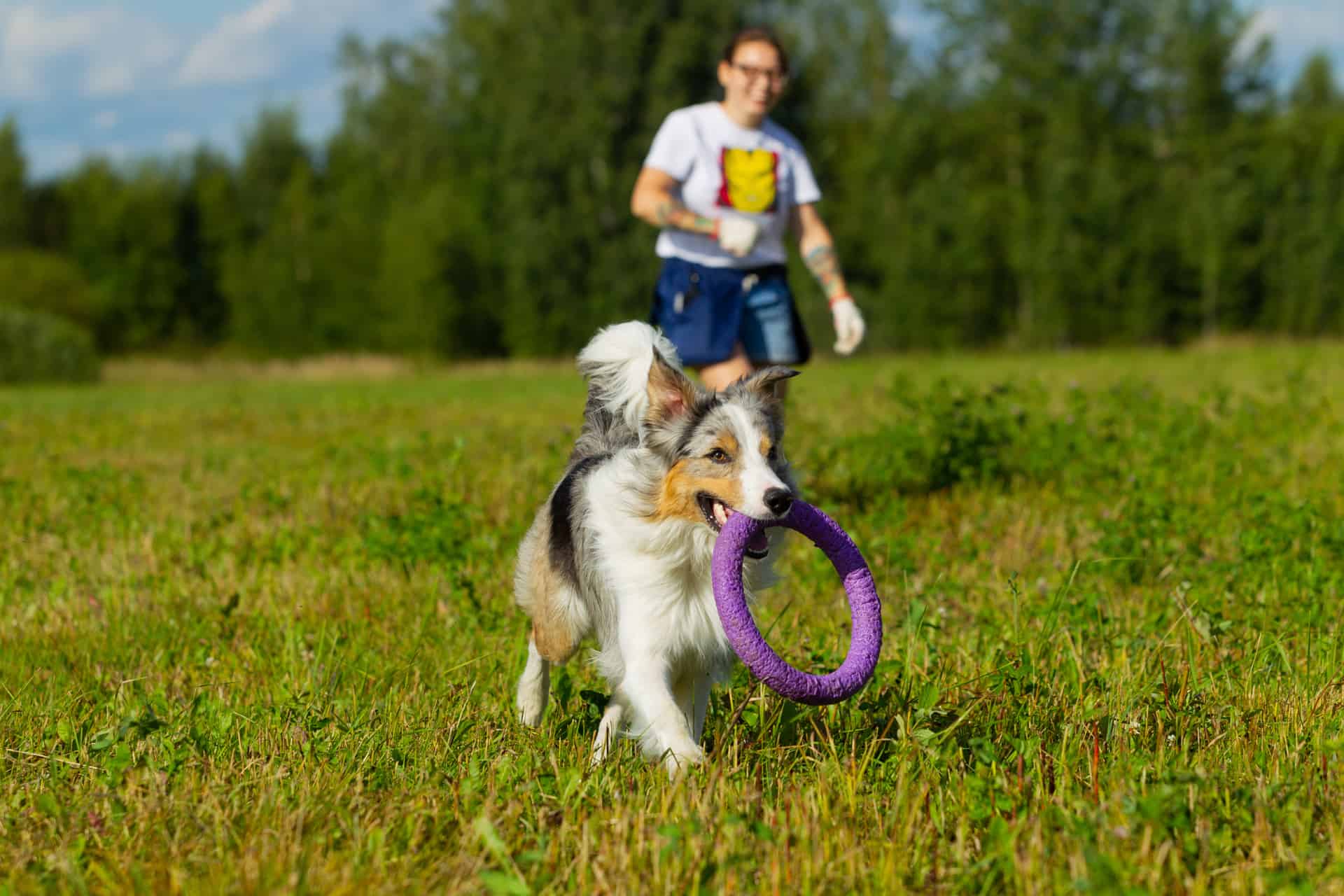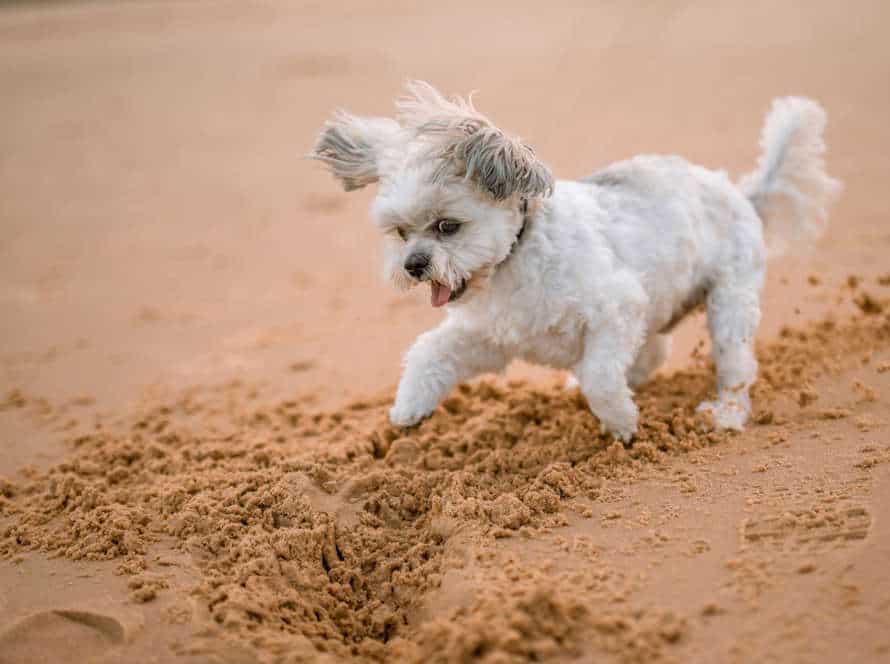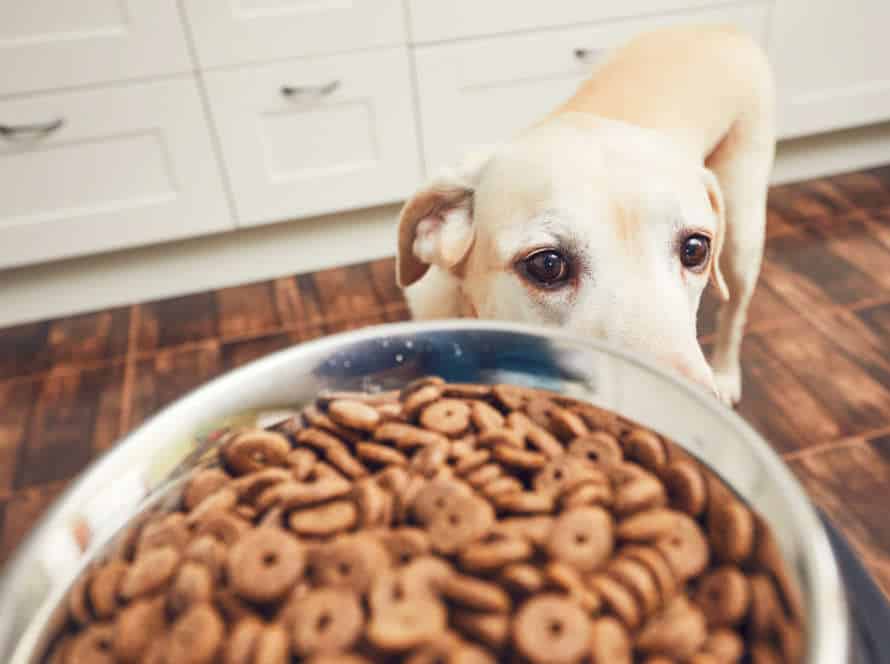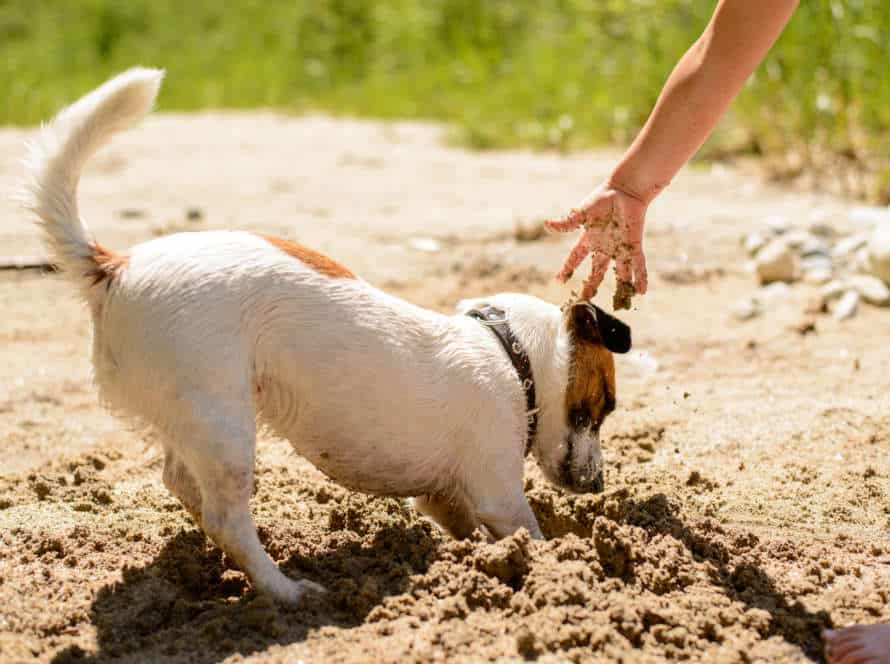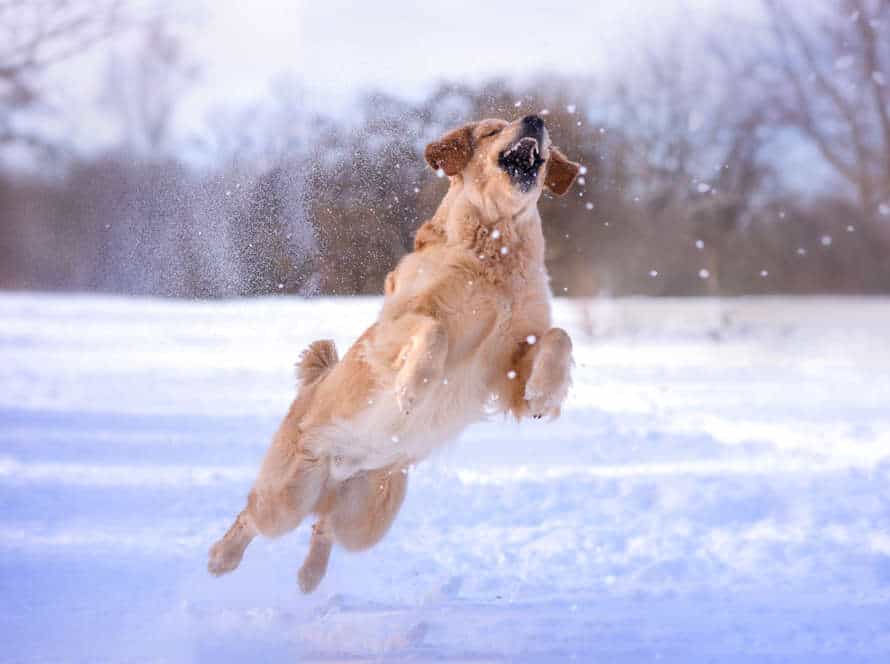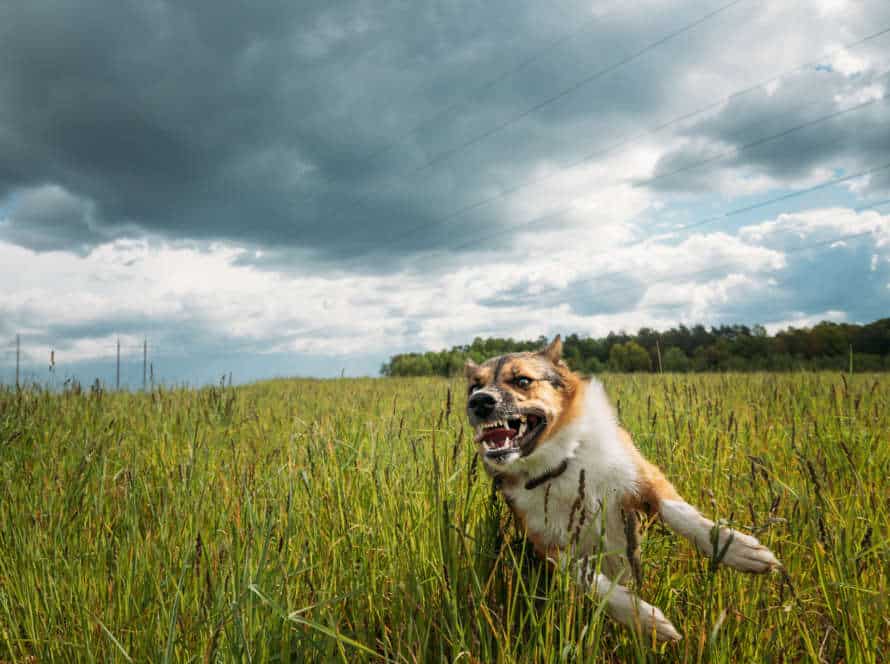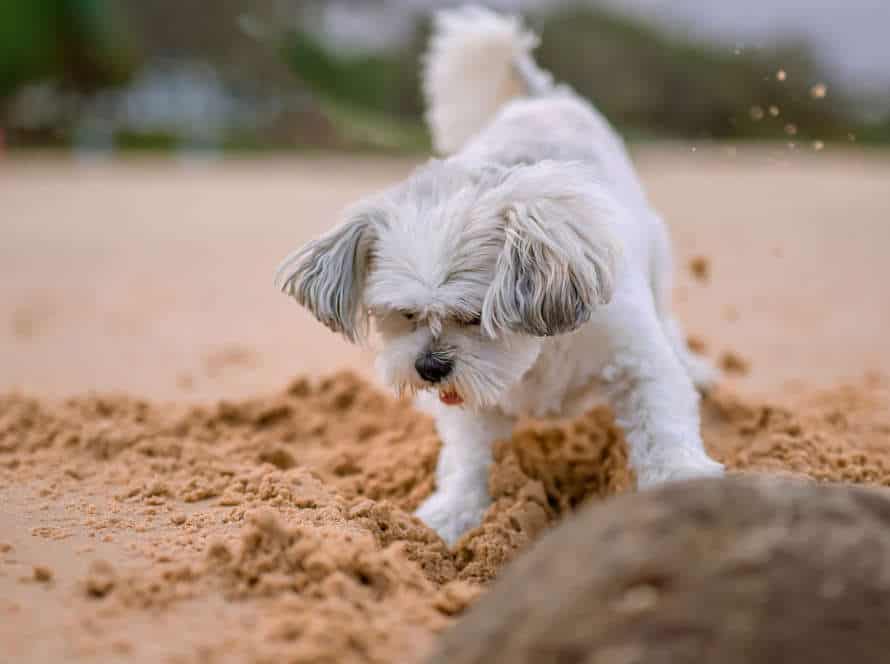Encouraging Polite Play: Teaching Puppies Boundaries
Puppy playtime is often full of lots of biting, nipping, and jumping. To help avoid bad behaviours later, it’s important to teach boundaries. Here are tips:
- Set specific times for play and training.
- If your pup gets aggressive, say “no” firmly and stop playing. This teaches them that rough play is not okay.
- Reward calm and gentle behaviour with treats or praise.
- Give your pup plenty of exercise, mental stimulation, and socialization. This prevents boredom and bad behaviour.
- Train your puppy to sit or lie down when they meet people. This stops them jumping.
- Consistency and patience are important. Setting boundaries takes time and effort, but it pays off in the end.
Understand Your Puppy’s Mental and Physical State
Before teaching boundaries to your puppy, comprehend their mental and physical development. Grasp their motivations, abilities, and limitations. Also, make sure their hormonal balance is good. This will make them ready to learn. How to do this? Let’s explore!
Recognize the body language and emotions of your puppy
It’s important to know your puppy’s body language and emotions. Ears, tail and stance can tell you a lot. For example, an erect tail and ears can mean excitement, while a tucked tail could signal fear.
Track their energy level too. If they’re bouncing and biting too much, they may need a break.
Reward good behaviour and set clear boundaries. Establish rules for playtime, and be consistent in following them.
This way, you’ll help create a healthy and happy relationship with your pup!
Understand the boundaries and limitations of your puppy’s age
It’s essential to recognize your puppy’s age boundaries and limits. Puppies develop in their own ways and have different personalities. So, it’s important to customize your training approach.
Puppies younger than six months are still in their socializing stage and need gentle, positive reinforcement techniques. They need physical limits and consistent routines to feel secure and trust their owners. Puppies older than six months need structure and rules to learn acceptable behavior.
Here are some tips to show puppies polite play and teach them boundaries:
- Set limits for what is and isn’t OK behavior during playtime.
- Watch over them during playtime and step in to redirect bad behavior when needed.
- Use positive reinforcement to reward good behavior and discourage bad behavior.
- Provide plenty of mental and physical stimulation to keep them from getting bored and exhibiting destructive behavior.
Keep in mind that every pup is unique and it’s important to understand their individual needs to create a safe and nurturing environment for them to learn and grow.
Be consistent in your training approach and commands
To successfully train your puppy, be consistent. Use the same words and actions every time. Here are some tips to help:
- Use short, clear commands.
- Repeat them consistently.
- Set clear rules for playtime.
- Stay firm and calm – no yelling!
Consistency is key to building good habits and bonding. Train lovingly and watch your pup grow into a happy adult dog.
Setting Limits and Enforcing Boundaries
Setting limits and boundaries for puppies is a must! It’s part of their socialization and training. Encourage polite play between puppies to help them learn manners and become socialized adults. Plus, boundaries and limits help puppies become more confident. Here’s how to do it right:
Use positive reinforcement techniques
Positive reinforcement techniques can help teach puppies boundaries and encourage polite play. Instead of punishing, reward good behavior with treats or affection. To redirect inappropriate behavior, focus your pup on another toy or activity. Ignoring bad behavior can be more effective than punishing it. It’s important to have consistency across the household with these techniques. Don’t forget to be patient – positive reinforcement can help create a strong bond between you and your pup!
Teach basic commands like “sit,” “stay,” and “come”
Training a puppy is essential. Teaching commands like “sit,” “stay,” and “come” help them understand boundaries. Here’s how to do it:
- Start in an area with no distractions.
- Use treats, praise, and petting to encourage learning.
- Teach “sit” by moving a treat above their head and up, which will make them sit.
- To learn “stay,” ask them to sit and stay in place for a few seconds before rewarding.
- To teach “come,” use a treat or toy to lure them.
With patience and consistency, your pup will learn these commands. Short and sweet sessions will keep them engaged and motivated.
Redirect unwanted behavior and discourage negative reactions
Redirecting bad behavior and discouraging negative reactions is key when teaching puppies to play nicely. Here are some tips:
- Distract and redirect: If your pup is displaying unwanted actions or aggression, use a toy or treat to move their interest to a better behavior.
- Use positive reinforcement: Reward good behavior with praise or treats.
- Be consistent: Set boundaries consistently and always – this teaches your puppy what is expected.
- Avoid punishment: Don’t punish or use physical force as it can be damaging to your pup’s training and your relationship.
It takes time and patience to train a puppy. Positive reinforcement and consistent boundaries help them learn to play properly and interact positively.
Encourage Socialization and Positive Play with Other Puppies
Socializing pups can aid them in becoming more secure and multi-faceted canines as they grow. A means to foster socialization and cheerful play with other puppies is to educate them on boundaries. This will form a healthy and safe atmosphere for all puppies and assist in teaching them the correct way to socialize with their peers.
Let’s delve deeper into teaching puppies boundaries!
Introduce your puppy to other dogs while under supervision
Introducing your pup to other dogs while you are there is a must for socializing them and teaching them to play nicely. Here’s what you need to keep in mind:
- Supervise all puppy-dog interactions.
- Match pup size, age and temperament when introducing.
- Use positive reinforcement to reward good behavior and redirect bad.
- Teach pup basic commands like ‘sit’, ‘stay’, and ‘come’.
- Let the puppy have some breaks or remove them if the situation gets too much.
- Socialization needs to go on for life. Pro Tip: Always watch their behaviour when interacting with other dogs to avoid aggression.
Allow your puppy to play with other puppies in a controlled environment
Letting your pup have fun with other pups in a managed setting is key for their socializing and positive play growth. To promote good play with other pups, try these tips:
- Choose a managed place: Look for playgroups or puppy courses supervised by knowledgeable trainers who know how to handle or step in for any issues.
- Set boundaries: Help your pup learn good manners. If they get too loud, rough or bitey, tap their nose or say “No” in a calming but firm voice. If they keep being aggressive, take them away until they learn to play properly.
- Allow breaks: Give your pup some downtime with water to cool off in between play sessions.
Socializing your pup with other pups helps them learn proper social skills and good behavior, so your furry friend can grow up happy, polite and well-adjusted.
Encourage positive play behavior and discourage aggression
It is essential to promote positive play behavior in puppies. As a pet owner, you need to recognize the signs of aggression and know how to stop it.
Here are some tips to encourage polite play and prevent aggression:
- Set boundaries. Teach puppies what’s allowed and what’s not. Limit playtime and supervise them.
- Reward good behavior. Praise your puppy for not being aggressive. Give treats for polite play.
- Know the signs of aggression. Learn to identify growling, biting, and tackling. Interrupt their play if you see any of these.
- Give each puppy their toys. This helps to avoid fights over them.
- Spay or neuter your puppies. This can reduce aggression and dominance.
By following these tips, your puppies will learn to play nicely and socialize with other puppies!
Reinforcing Positive Behaviors
Reinforcing good behaviors is a must when teaching puppies boundaries. Give positive reinforcement when puppies show polite play. This can be treats, words of praise or physical affection.
In this article, we’ll look at various ways to reinforce positive behaviors when teaching puppies polite play.
Reward positive behaviors with praise and treats
Reinforce good behavior and encourage polite play with your puppy by rewarding them with praise and treats! Here’s how:
- Identify which behaviors you want to see more of – like sitting politely before being petted or playing gently with toys.
- Praise your pup straight away with an upbeat voice when they show the desired behavior.
- Reward them with a small treat, like kibble or a toy.
- Be consistent with both praise and rewards. Don’t reinforce bad behavior by withholding attention or treats.
- Positive reinforcement is about promoting the behaviors you want – not punishing the ones you don’t. With patience and practice, your pup will grow into a well-behaved, happy adult dog.
Provide your puppy with plenty of activities and toys to keep them engaged
For good doggy behavior, it’s important to give pups activities and toys. Here are some tips for choosing them:
- Get size-appropriate, safe, non-toxic toys.
- Puzzles, chews, interactive toys, and outdoor toys are good options.
- Change toys every few days to keep ’em interested.
- Train your pup. Reward good behavior and use positive language.
- Give enough exercise, food, water, and rest.
Create and maintain positive routines to reinforce good behavior
Positive routines can be real game-changers for your pup. Here are some tips to help you out:
- Set limits: Let your puppy know what you expect. Use praise and treats to reward good behaviour.
- Playtime: This is a must for puppies. It helps them socialize, develop physical skills, and learn boundaries. Set up a regular schedule and use toys they love.
- Consistent commands: Use the same words like “No” and “Good boy/girl” every time. Repeat them and reward good behaviour.
- Feeding and potty time: Create a specific routine. This will help your pup get used to it and reduce accidents.
By following these steps, you can help your pup develop behaviour that will last forever.
Pro tip: Patience and positive reinforcement will help your pup learn boundaries and be polite during playtime.
Avoiding Common Training Mistakes
Puppy training can be tricky. Avoid making mistakes by being consistent. Don’t reinforce bad behaviors or demand too much. Here, we’ll go over some common mistakes to avoid while teaching polite play and boundaries to your pup.
Do not use physical punishment or negative reinforcement
Physical punishment or negative reinforcement is not the way to teach puppies polite behaviour and boundaries. These methods can ruin the relationship between you and your pup.
So, here are some tips for teaching boundaries without physical punishment:
- Reward good behaviour with treats, verbal praise, and toys.
- Set clear rules and stay consistent with them.
- Redirect unwanted behaviour onto an appropriate object or activity.
- Use a firm, calm voice to stop biting or jumping.
- Be patient and consistent with training – it may take time for your pup to learn.
By following these tips, you’ll have a happy bond with your pup and they’ll learn how to play nicely.
Do not allow your puppy to develop separation anxiety
Separation anxiety is a problem for many puppies. It can cause destructive behavior, barking, and other bad habits. Therefore, it’s important not to make mistakes that could make anxiety worse. Here’s some advice:
- Gradually increase the time away from your puppy, from short times to longer ones.
- Don’t say goodbye or hello with too much emotion, as this could worsen anxiety.
- Give your puppy something to do while you’re away, like a toy or something safe.
- Crate train, or get a pet sitter, if needed.
- Ensure you’re consistent with training and don’t punish your puppy for anxious behaviors.
- Encourage polite play and set clear boundaries, to make your puppy feel secure.
Do not let your puppy bite or nip at people or other pets
No biting or nipping, or else! Allowing your pup to do this is a mistake that can lead to serious behaviour issues. Pups need to learn the line between play and aggression. Here are some tips to make sure the pup plays politely:
- Interrupt playtime when they start biting/nipping. Use a firm vocal signal like “no” or “stop”.
- Redirect the biting to an appropriate chew toy.
- Reinforce good play – praise them when they play appropriately.
- Be consistent with training – they need to understand what’s expected.
With patience and training, they’ll learn to play nicely and not hurt others. Remember – always consult a professional if you’re having trouble training your pup.
Conclusion and Final Thoughts
Understand your pup’s needs and teach them polite play. You’ll then be rewarded with a happier pooch. Patience and consistency are important. Let’s review the key points of teaching puppies boundaries. This will make your home safe and content for you and your pup.
Recap the importance of teaching boundaries to puppies
Teaching boundaries to puppies is vital. It helps them grow into well-balanced adult dogs. If not taught, they display undesirable behaviours like biting, jumping, and excessive barking.
Boundaries teach puppies what is and isn’t acceptable. This provides structure and prevents bad habits. Setting boundaries also builds trust and respect between pup and owner. For a long-lasting relationship, this is essential.
Consistency is key when teaching boundaries. Rules must be clear and enforced. This helps your pup know what is expected.
Provide some final tips for promoting polite play in puppies
As a dog owner, it is essential to nurture polite play in your puppies from a young age. This will ensure their safety and teach them social skills with other dogs. Here are some suggestions for promoting polite play in puppies:
- Observe your pup’s body language during play. If there is any sign of unease, intervene right away and separate the dogs until they are calmer.
- Reward good behavior during play and discourage rough or aggressive behavior. Redirect your puppy to safe and appropriate toys.
- Supervise play sessions. Particularly if you have multiple puppies or dogs. This will ensure fair and friendly playtime.
By following these tips, you will create a safe and positive environment for your puppies. They can learn how to play and interact politely.
Frequently Asked Questions
1. What is the importance of teaching puppies boundaries?
Teaching puppies boundaries is important because it helps them learn what is acceptable behavior and what is not. This helps prevent future behavior problems and ensures they can live happily with their human family and other dogs.
2. How can I encourage polite play in my puppy?
You can encourage polite play in your puppy by setting guidelines for playtime, rewarding good behavior, and stopping any rough play or biting. Consistency is key to making sure your puppy understands what behavior is expected of them.
3. Is it okay to let puppies play fight?
No, it is not okay to let puppies play fight. Play fighting can quickly escalate into real fighting, and it can reinforce aggressive behavior. Puppies need to learn that aggressive behavior is not appropriate, and it is your responsibility to teach them how to play politely.
4. How can I stop my puppy from biting?
You can stop your puppy from biting by redirecting their attention, using positive reinforcement for good behavior, and discouraging rough play. It is also important to teach them a command like “leave it” or “no biting” to reinforce appropriate behavior.
5. How can I socialize my puppy while also teaching them boundaries?
It is important to socialize your puppy while also teaching them boundaries. You can do this by setting up playdates with other friendly and well-behaved dogs, rewarding good behavior, and stopping any rough play or biting. It is also important to supervise your puppy during socialization to ensure they are safe and learning appropriate behavior.
6. What should I do if my puppy continues to exhibit aggressive behavior?
If your puppy continues to exhibit aggressive behavior, it is important to seek the help of a professional dog trainer. They can assess the situation and provide guidance on how to train your puppy to behave appropriately and safely.

